| Listing 1 - 10 of 11 | << page >> |
Sort by
|
Book
ISBN: 9782753555204 2753555206 Year: 2017 Publisher: Rennes: Presses universitaires de Rennes,
Abstract | Keywords | Export | Availability | Bookmark
 Loading...
Loading...Choose an application
- Reference Manager
- EndNote
- RefWorks (Direct export to RefWorks)
Avant-hier encore jugée incompréhensible pour les Occidentaux, l’écriture chinoise attire de nos jours de plus en plus d’amateurs de tous âges et de tous horizons. Beaucoup d’entre eux se heurtent alors à des difficultés imprévues pour apprendre les caractères ; difficultés qui ne tiennent pas forcément aux signes eux-mêmes mais surtout au manque de logique des méthodes d’enseignement, très (trop) souvent irrespectueuse du génie et des logiques de l’écriture chinoise. Aussi, est-ce pour mieux comprendre les réalités de cette écriture singulière que Bernard Allanic, enseignant de chinois lui-même, a entrepris de se pencher sur la façon dont les instituteurs chinois s’y prenaient pour enseigner la lecture aux enfants. Cet ouvrage retrace ainsi l’histoire des principaux manuels et méthodes d’enseignement des caractères utilisés en Chine pendant près de deux mille ans. Deux questions fondamentales y sont posées : 1) Y-a-t-il un seuil de caractères à atteindre pour pouvoir commencer à lire ? 2) Existe-t-il (ou a-t-il existé) en Chine une méthode idéale, une Voie des signes dont les enseignants de chinois langue étrangère pourraient s’inspirer pour améliorer leurs méthodes d’enseignement des caractères chinois ?
S14/0800 --- S15/0319 --- S15/0320 --- China: Education--Teaching methods --- China: Language--Traditional characters (fantizi) --- China: Language--Simplified characters (jiantizi) --- Reading --- Education --- Chinese language. --- Education. --- Reading. --- China. --- China
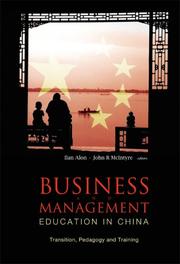
ISBN: 9812563229 9786611372958 1281372951 981270342X 9789812703422 9789812563224 9781281372956 Year: 2005 Publisher: Hackensack, NJ ; London : World Scientific,
Abstract | Keywords | Export | Availability | Bookmark
 Loading...
Loading...Choose an application
- Reference Manager
- EndNote
- RefWorks (Direct export to RefWorks)
This pioneering book offers a unique constellation of essays focused on the important social and economic changes affecting educational institutions in China. It provides an in-depth examination of the potential and obstacles for business and management education in the world's second largest economy and most populated country. This volume is an essential resource for anyone with an interest in teaching, developing a new program, or entering into a joint venture in China. A wide range of topics, such as economic transition, pedagogical issues, professional training and alliance formation, are
Business education. --- Management. --- S14/0815 --- S14/0800 --- China: Education--Management training --- China: Education--Teaching methods --- Business education --- Management --- Study and teaching --- Administration --- Business --- Commercial education --- Education, Business --- Industrial relations --- Organization --- Education
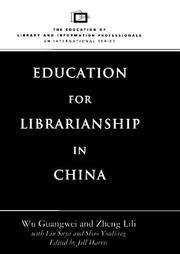
ISBN: 0720121930 9786611297916 1281297917 1847142907 9781847142900 9780720121933 9781847142900 9781281297914 661129791X Year: 1997 Volume: *1 Publisher: Washington : Mansell,
Abstract | Keywords | Export | Availability | Bookmark
 Loading...
Loading...Choose an application
- Reference Manager
- EndNote
- RefWorks (Direct export to RefWorks)
A detailed study of the education and training of information professionals in China, including the People's Republic, Hong Kong, Macau, and Taiwan, offering insights into history, the present situation, and future scenarios. Chapters concentrate on educational and pedagogical matters in an apolitical fashion. Subjects include history of library science education, employment conditions of library school educators, and international cooperation in library science education. Includes a directory of library and information programs of higher education and a list of library conferences in China.
S14/0800 --- S01/0400 --- Library education --- -Librarians --- Library science --- Professional education --- Library schools --- China: Education--Teaching methods --- China: Bibliography and reference--Libraries, library-catalogues, librarianship, archives --- Education --- Study and teaching --- -China: Education--Teaching methods --- Librarians --- China --- Library education - China. --- Education, Higher
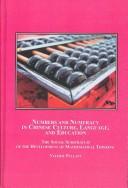
ISBN: 9780773452558 0773452559 Year: 2007 Publisher: Lewiston Mellen
Abstract | Keywords | Export | Availability | Bookmark
 Loading...
Loading...Choose an application
- Reference Manager
- EndNote
- RefWorks (Direct export to RefWorks)
S11/0607 --- S13A/0450 --- S14/0800 --- S19/1100 --- China: Social sciences--Symbols --- China: Religion--Astrology, fortune-telling, physiognomy, occultism, numerology, divination --- China: Education--Teaching methods --- China: Natural sciences--Mathematics (incl. abacus) --- Mathematics, Chinese --- Number theory --- Numeracy --- Philosophy --- History. --- Philosophy. --- Mathematical ability --- Mathematics --- Statistics --- Number study --- Numbers, Theory of --- Algebra --- History
Book
ISBN: 9781139336505 1139336509 9781139028400 1139028405 9780521768290 0521768292 9780521160629 0521160626 1107225205 1139334018 1280393505 1139337378 9786613571427 1139339826 1139341405 1139338242 9781107225206 9781139334013 9781280393501 9781139337373 6613571423 9781139339827 9781139341400 9781139338240 Year: 2012 Publisher: Cambridge Cambridge University Press
Abstract | Keywords | Export | Availability | Bookmark
 Loading...
Loading...Choose an application
- Reference Manager
- EndNote
- RefWorks (Direct export to RefWorks)
Western and East Asian people hold fundamentally different beliefs about learning that influence how they approach child rearing and education. Reviewing decades of research, Dr Jin Li presents an important conceptual distinction between the Western mind model and the East Asian virtue model of learning. The former aims to cultivate the mind to understand the world, whereas the latter prioritizes the self to be perfected morally and socially. Tracing the cultural origins of the two large intellectual traditions, Li details how each model manifests itself in the psychology of the learning process, learning affect, regard of one's learning peers, expression of what one knows and parents' guiding efforts. Despite today's accelerated cultural exchange, these learning models do not diminish but endure.
Learning, Psychology of --- Learning --- S11/0731 --- S14/0200 --- S14/0454 --- S14/0800 --- Learning process --- Comprehension --- Education --- Psychology of learning --- Educational psychology --- Learning ability --- China: Social sciences--Childhood, youth --- China: Education--General works --- China: Education--Education: since 1989 --- China: Education--Teaching methods --- Psychological aspects --- Learning, Psychology of. --- Health Sciences --- Psychiatry & Psychology
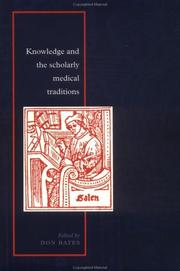
ISBN: 052148071X 0521499755 0511621663 Year: 1995 Publisher: Cambridge : Cambridge University Press,
Abstract | Keywords | Export | Availability | Bookmark
 Loading...
Loading...Choose an application
- Reference Manager
- EndNote
- RefWorks (Direct export to RefWorks)
However much the three great traditions of medicine - Galenic, Chinese and Ayurvedic - differed from each other, they had one thing in common: scholarship. The foundational knowledge of each could only be acquired by careful study under teachers relying on ancient texts. Such medical knowledge is special, operating as it does in the realm of the most fundamental human experiences - health, disease, suffering, birth and death - and the credibility of healers is of crucial importance. Because of this, scholarly medical knowledge offers a rich field for the study of different cultural practices in the legitimation of knowledge generally. The contributors to this volume are all specialists in the history or anthropology of these traditions, and their essays range from historical investigations to studies of present-day practices.
Knowledge and learning --- Medical anthropology --- Medicine --- Savoir et érudition --- Anthropologie médicale --- Médecine --- Philosophy --- Philosophie --- S21/0300 --- S14/0800 --- 61 <09> --- -Clinical sciences --- Medical profession --- Human biology --- Life sciences --- Medical sciences --- Pathology --- Physicians --- Medical care --- Anthropology --- China: Medicine, public health and food--Chinese medicine: general --- China: Education--Teaching methods --- Geschiedenis van de geneeskunde --- Anthropological aspects --- -China: Medicine, public health and food--Chinese medicine: general --- 61 <09> Geschiedenis van de geneeskunde --- -Medical care --- Clinical sciences --- Savoir et érudition --- Anthropologie médicale --- Médecine --- Medical logic --- 61 <09> History of medicine --- History of medicine --- Health Workforce --- Social Sciences --- Medical anthropology. --- Philosophy.

ISBN: 0521642361 0521645425 0511016123 1280432446 0511151845 0511051743 0511172923 9786610432448 0511612451 0511303211 1107116449 9780521645423 9780511612459 9780521642361 9780511016127 9780511151842 9780511172922 9781280432446 9780511051746 6610432449 9780511303210 Year: 1999 Volume: 7 Publisher: Cambridge Cambridge University Press
Abstract | Keywords | Export | Availability | Bookmark
 Loading...
Loading...Choose an application
- Reference Manager
- EndNote
- RefWorks (Direct export to RefWorks)
This is one of the first studies of traditional medical education in an Asian country. Conducting extensive fieldwork in Kunming, the capital of Yunnan Province in the People's Republic of China, Elisabeth Hsu became the disciple of, a Qigong master a scholarly private practitioner, who almost wordlessly conveys esoteric knowledge and techniques; attended seminars given by a senior Chinese doctor, an acupuncturist and masseur, who plunges his followers into the study of arcane medical classics, and studied with students at the Yunnan College of Traditional Chinese Medicine, where the standardised knowledge of official Chinese medicine is inculcated. Dr Hsu compares the theories and practices of these different Chinese medical traditions and shows how the same technical terms may take on different meanings in different contexts. This is a fascinating, insider's account of traditional medical practices, which brings out the way in which the context of instruction shapes knowledge.
Medicine, Chinese --- Medical anthropology --- Médecine chinoise --- Anthropologie médicale --- Study and teaching --- Etude et enseignement --- S21/0300 --- S14/0800 --- S18/0352 --- China: Medicine, public health and food--Chinese medicine: general --- China: Education--Teaching methods --- China: Music and sports--Qigong --- #A0503W --- Medical anthropology. --- Medical anthropology - Study and teaching - China. --- Medicine, Chinese. --- Education, Medical --- Medicine, Chinese Traditional --- Medicine, East Asian Traditional --- Education, Professional --- Education --- Medicine, Traditional --- Complementary Therapies --- Culture --- Anthropology, Education, Sociology and Social Phenomena --- Therapeutics --- Anthropology, Cultural --- Anthropology --- Analytical, Diagnostic and Therapeutic Techniques and Equipment --- Social Sciences --- History of Medicine --- Medicine --- Health & Biological Sciences --- Médecine chinoise --- Anthropologie médicale --- Medical care --- Chinese medicine --- TCM (Medicine) --- Traditional Chinese medicine --- Traditional medicine --- Anthropological aspects
Book
ISBN: 9782724625752 2724625757 Year: 2020 Publisher: Paris: Presses de sciences po,
Abstract | Keywords | Export | Availability | Bookmark
 Loading...
Loading...Choose an application
- Reference Manager
- EndNote
- RefWorks (Direct export to RefWorks)
"La Chine de Xi Jinping se présente sur la scène internationale comme un modèle de modernisation alternatif à celui du monde occidental. Pourtant, une grande partie de la bureaucratie chinoise se forme depuis le début du siècle à l'aide de méthodes pédagogiques et de contenus d'inspiration américaine, sous l'égide d'enseignants revenus de l'étranger. Plusieurs milliers d'agents du secteur public s'inscrivent tous les ans dans un master en administration publique (MPA pour Master in Public Administration), un programme promu par la Harvard Kennedy School et arrivé en Chine avec le nouveau siècle. En suivant le fil de cette formation et grâce à une centaine d'entretiens, la plupart réalisés sur place en chinois, Alessia Lo Porto-Lefébure interroge le sens de cet emprunt chargé de valeurs politiques si éloignées de celles portées par l'Etat-parti. Elle donne à voir comment la classe dirigeante négocie au quotidien la modernisation économique du pays et le maintien d'un régime autoritaire."
S11/0708 --- S14/0454 --- S14/0800 --- S06/0260 --- S06/0223 --- China: Social sciences--Elite --- China: Education--Education: since 1989 --- China: Education--Teaching methods --- China: Politics and government--The Chinese model --- China: Politics and government--People's Republic: general: since 1976 --- Public administration --- Education, Higher --- Higher education and state --- Educational exchanges --- Study and teaching --- American influences --- MPA wen ku --- China --- Officials and employees --- Education --- Public administration - Study and teaching - China --- Education, Higher - China - American influences --- Higher education and state - China --- Educational exchanges - China --- China - Officials and employees - Education
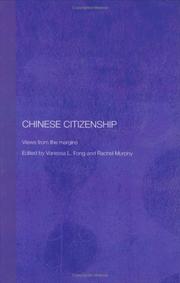
ISBN: 0415371457 Year: 2006 Publisher: London ; New York, NY : Routledge,
Abstract | Keywords | Export | Availability | Bookmark
 Loading...
Loading...Choose an application
- Reference Manager
- EndNote
- RefWorks (Direct export to RefWorks)
Marginality, Social --- Citizenship --- People with social disabilities --- Marginalité --- Citoyenneté --- Education civique --- Handicapés sociaux --- Study and teaching --- Government policy --- Politique gouvernementale --- S14/0454 --- S14/0800 --- S06/0240 --- S06/0255 --- China: Education--Education: since 1989 --- China: Education--Teaching methods --- China: Politics and government--Policy towards minorities and autonomous regions --- China: Politics and government--Political theory: modern (and/or under Western influence) --- S02/0200 --- S06/0260 --- Exclusion, Social --- Marginal peoples --- Social exclusion --- Social marginality --- Assimilation (Sociology) --- Culture conflict --- Social isolation --- Sociology --- Birthright citizenship --- Citizenship (International law) --- National citizenship --- Nationality (Citizenship) --- Political science --- Public law --- Allegiance --- Civics --- Domicile --- Political rights --- Culturally deprived people --- Culturally disadvantaged people --- Disadvantaged people, Culturally --- Disadvantaged people, Socially --- People with cultural disabilities --- Socially disadvantaged people --- Socially handicapped --- Underprivileged people --- People with disabilities --- China: General works--Civilization and culture --- China: Politics and government--The Chinese model --- Law and legislation --- MARGINALITE SOCIALE --- CITOYENNETE --- HANDICAPES --- CHINE --- ETUDE ET ENSEIGNEMENT --- POLITIQUE ET GOUVERNEMENT
Book
ISBN: 0802222366 Year: 1980 Publisher: New York
Abstract | Keywords | Export | Availability | Bookmark
 Loading...
Loading...Choose an application
- Reference Manager
- EndNote
- RefWorks (Direct export to RefWorks)
Education --- #SML: Joseph Spae --- S06/0432 --- S14/0450 --- S14/0800 --- History --- China: Politics and government--About works and thought of Mao Zedong; Mao Cult --- China: Education--Contemporary education since 1949 --- China: Education--Teaching methods --- Mao, Zedong, --- Mao, Tse-tung, --- Mao, Ze Dong, --- Maozedong, --- Mao, Zetong, --- Mao, Zhe Dong, --- Mao, Ce-tung, --- Mao, Tsetung, --- Mau, Tze-toeng, --- Mao, Tze-tung, --- Mao, Trạch Đông, --- Mao, Tsé Toung, --- Mao, T︠S︡zė-dun, --- Maočhœ̄tung, --- Mao, Čhœ̄tung, --- Mao, Čhœ̄-tung, --- Mau, Tje-tung, --- Māw, Tsī Tūngh, --- Mo, Tʻaek-tong, --- Mō, Taku-tō, --- Mō, Takutō, --- Māʼo Sétung, --- Mā, Cē Tuṅ, --- Mācētuṅ, --- 毛澤東, --- 毛泽东, --- 毛沢東, --- Mao, Yongzhi, --- Mao, Yung-chih, --- 毛詠芝, --- 毛咏芝, --- Mao, Runzhi, --- Mao, Jun-chih, --- 毛潤芝, --- 毛润芝, --- 毛润之, --- Li, Desheng, --- Li, Te-sheng, --- 李德勝, --- Shisanyazi, --- 石三伢子, --- Ershibahuasheng, --- Er shi ba hua sheng, --- Ershiba hua sheng, --- Erh shih pa hua sheng, --- 二十八画生, --- Māvō, --- Tūng, Māʼūze, --- Tse-Tung, Mao, --- Tung, Mao Tse, --- Great Helmsman, --- Mao Zedong --- Mao, Zedong --- Mao Tse-Toung --- Mao Tsetoeng --- Mao Tsetoung --- Mao Tsetung --- Mao, Tse-Toung --- Mao, Tsé toung --- Mao, Tse-Tung --- Mau Tse-Toeng --- Mao, Ze dong --- 毛泽东 --- 毛澤東
| Listing 1 - 10 of 11 | << page >> |
Sort by
|

 Search
Search Feedback
Feedback About UniCat
About UniCat  Help
Help News
News